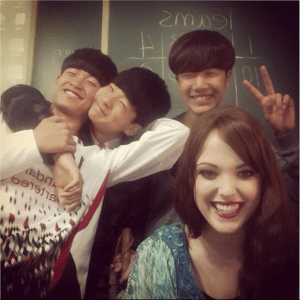Differences Between America and Korea Part 3

Differences between America and Korea are forever being highlighted to me during my time in Korea. I wanted to share with you 30 of the main differences that I have noticed in this three part series. You can find the final 10 differences below.
 21. Public appearance
21. Public appearance
I previously mentioned the emphasis placed on appearance in Korea, and this extends that point. It’s very common to see girls (and guys) staring into their mirrors or phones, examining and adjusting their hair in public.
It happens on the bus, at a red light, in restaurants, while walking, and in random storefront windows which have a mirrored reflection. Appearance is just extremely important to Koreans.
22. Animated culture
Koreans are very much about being “cute.” They love apps that add animation to their pictures, cute anime-looking characters as logos, and most of all, the use of animated emojis. Talk to any Korean in Kakao (the Korean Whatsapp) and every other sentence will have a moving, smiling character emoji.
23. Korean Age
The day you are born here, you are instantly 1-year-old. As the new year commences, you become 2, and so on every new year. This is how Korean age works. So essentially, all Koreans turn a year older at the same exact time. For us non-Koreans, this means our Korean age will always be 1-2 years more than our actual age.
24. How old are you?
Staying on the subject of age, this is very important early on in a Korean conversation. Shortly after meeting a Korean person, the question of “How old are you?” may come very soon after “Nice to meet you.”
It’s a culture much about hierarchy, so it’s important for them when addressing someone older (as they have respectful titles for this). It’s also important when pouring drinks, as the younger pours for the older. It factors into more showings of respect as well; which you gradually learn each time you make a mistake.
25. Don’t take that picture!
I feel like I keep reverting back to the subject of appearance, but it’s just so embedded in the culture that it’s hard not to notice! Koreans love taking pictures. Korean people particularly love selfies. They love designing them with animations, as mentioned above.
What they don’t love though is when an unexpected picture is taken of them. They downright dread this. I’ve taken pics of my students, and they all hide their faces and run away. I’ve seen it happen with adults as well. One friend even got chewed out for posting an ‘unapproved’ picture on Facebook of himself with a Korean person.
26. Transient teachers
When you meet an older, more experienced teacher at a school, chances are they’re a newbie (to the school) like yourself. Why? Because teachers must change schools every 4 years. Must be tough forging close relationships with employees, or the school itself, to have to say goodbye so often.
27. Give old people the right of way
This is a point that will really test your patience and character. There’s no doubt that older people can be cranky; we’ve all experienced this. But back home, I’ve encountered some of the most caring and thoughtful old folks who’ve shown me courtesy as if I were their elder.
It can be very different here; for example, when boarding a bus, the older generation will rush to the door and straight up cut you off as if it were the last bus operating in Korea ever again. Many are nice people when you greet them, and understanding this as culturally respectful towards elders is important.
28. Where are the bald men?
This may seem like a funny point to add on a list regarding a country’s traits, but if it’s enough for me to notice then it’s worth mentioning. I’ve honestly never seen bald men in Korea. Not young, not old, not any. The men don’t keep facial hair, but they do keep it on their head.
29. Where’s that restaurant that was there yesterday?
The frequency of businesses opening and closing is fascinating. You can walk in your city’s downtown area lined with a variety of restaurants on Monday, go back in 2 weeks, and I guarantee there will be 3-5 new businesses replacing the prior.
It’s stunning how quick and often this happens. Koreans make businesses turn around in no time, the speed of construction is remarkable. It’s unfortunate to lose spots you’ve enjoyed, but there’s always somewhere new to try.
30. No daylight savings time
This was interesting to me as I wasn’t aware that countries can basically control this. There is no ‘spring forward, fall backward’ here, as the time stays consistent year-round.
However, DST will still apply when calling home to western countries. You’d be amazed how much that one-hour difference makes when you only have to stay up till midnight to call your mom versus 1am.
This completes my 3-part series on things about Korea. I really enjoy spotting differences in cultures. I walk and see something, and immediately jot it down in my phone. This is how I was able to compile this list. I’m sure this list will continue to grow while I’m here!





